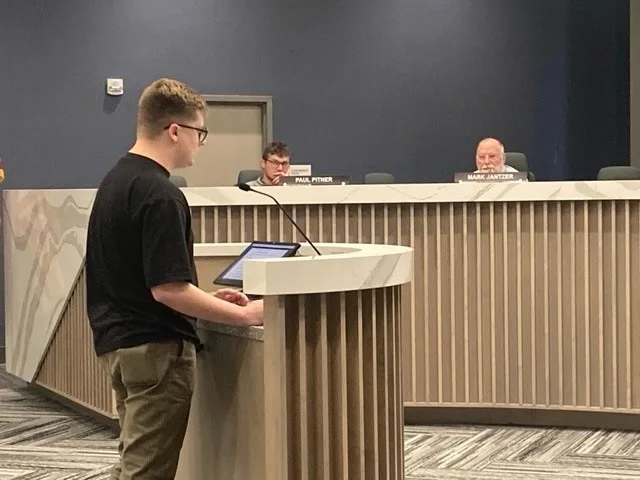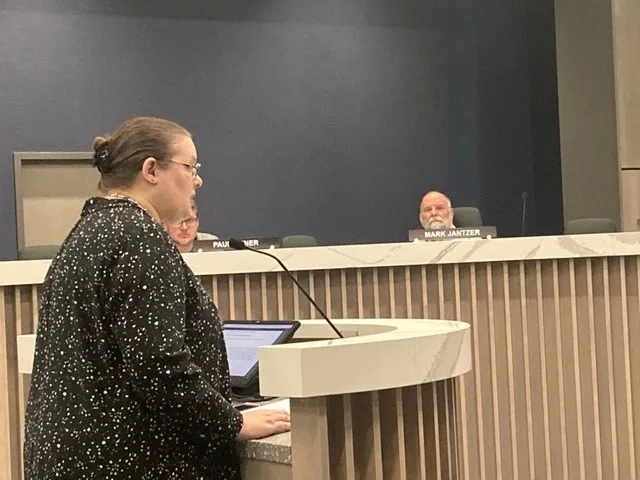

MINOT – The Minot City Council’s first meeting in the new City Hall Monday mostly consisted of testimony from citizens disagreeing over a Human Relations Committee which quickly rolled into a discussion of LGBTQ+ topics.
The disagreement was sparked due to updates in wording for the creation of an HR Committee, though the general creation of the committee was tabled for the next Council meeting on May 15.
The HRC was originally created in 1976 but has essentially been non-existent for over a decade. The purpose of the committee would be to discourage discrimination based on race, color, religion, national origin, or sex. New wording was added on the ordinance’s first reading two weeks ago to add sexual orientation, gender identity, pregnancy, survivors of sexual assault, citizenship status, source of income, and military or veteran status as protections to the purpose of the committee.
Council member Lisa Olson said she has heard from a lot of residents in Minot concerned about the updated wording, though not necessarily the creation of the HRC itself. She made a motion to keep the original wording, and she read the original wording before the Council.
“I think that’s very encompassing,” said Olson. “If it’s not accurate, if it’s not inclusive enough, I think if this committee were stood up and we had the opportunity to continue this conversation, we probably would have what most people feel is acceptable, as far as wording in the ordinance, to come before us and be able to take an informed action on it. None of my intent in this is to not hear the voice of anyone in this room. This is not a non-LGBTQ motion. The intent is to get it right, and right now what we have works well enough.”
Olson added that she personally feels rushed and wants to make sure if the Council passes the ordinance for the committee, they do it the right way.
“The upgraded language was adding protection for people like me,” said Council member Carrie Evans. “People who are queer, disabled, for people who may have a criminal conviction. For people who may be receiving social assistance. For veterans. That’s the radical change. And it’s not protections, it’s just saying let’s have the committee talk about these people that live in our community.”
Evans said in the last Council meeting that she hopes the committee is the precursor to an anti-discrimination ordinance in Minot. She encouraged the mayor to open up the discussion for the public to speak. A dozen people testified on the issue, half in favor and half opposed to the new wording.
Wendi Baggaley, Minot, said she and others have been noticing books within local libraries that are oversexualized and not appropriate for children. She believes that the HRC is a reaction to North Dakota legislative bills prohibiting those books from being accessible to children.

“What I have seen across the country is a radical, gender theory ideology that has essentially gone step by step, through great sounding words, to then force individuals, force businesses, force communities to accept lifestyles and policies that the vast majority of the people in the community would not appreciate,” said Baggaley.
Baggaley said she appreciates what Evans has done for the library.
“But at the same time, we need to have healthy boundaries,” said Baggaley. “We are starting to see in our communities the push towards mutilation of children, oversexualization of children, and acceptance of transgender persons in sports that actually hurts the people that Title IV was originally designed to help.”
Levi Pierpont, Minot, said no one has talked about the addition of protections for religious beliefs, pregnancy status, disability, and military status.
“How would you feel if you or your child was part of that group that’s the only one being spoken about?” said Pierpont. “I also support these additions, especially disabilities. That’s so important, including people… That’s no different for trans people. That’s no different for gay people. It’s just a different type of approaching life and being a person. It’s not a deviant lifestyle, it’s the person that you are.”
Pierpont said people who believe children are having regular gender reassignment surgeries should meet trans people.
“That’s not what’s happening,” said Pierpont. “It’s a moral panic. Around people like me, around my brothers and sisters in the trans community, and it hurts so much to live in a place like this, where there’s such a focus on us. Why us? I know that the people who spoke about mutilation think that they’re doing the right thing. I appreciate that they’re involved. I just want those people to be more open about having conversations. This state is not yours to turn into a theocracy.”
“It makes me sad that we’re here to talk about this issue and not the actual issues that make this community great; what we were tasked to do as elected officials,” said Councilman Paul Pitner. “I don’t expect the city to protect my kids, that’s my job. These are just words. They’re not forcing us to do anything. They’re forcing us to maintain an open heart.”
Pitner moved to table the item to the next Council meeting due to Council member Stephan Podrygula’s abscence and concerns from citizens that it is being rushed. The Council voted unanimously to table the item.